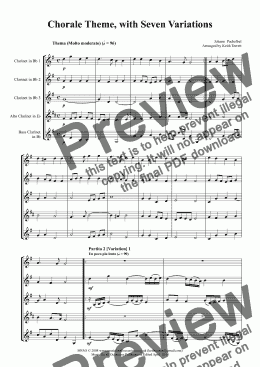Ready to print
You have already purchased this music, but not yet printed it.
This page is just a preview and does not allow printing. To print your purchase, go to the My purchases page in your account and click the relevant print icon.
Chorale Partita with Seven Variations for Clarinet Ensemble

Already purchased!
You have already purchased this score. To download and print the PDF file of this score, click the 'Print' button above the score. The purchases page in your account also shows your items available to print.
This score is free!
Buy this score and parts
Chorale Partita with Seven Variations for Clarinet Ensemble
$10.00
Preview individual parts:
Instant download
You are purchasing high quality sheet music PDF files suitable for printing or viewing on digital devices.An arrangement of Pachelbel’s Chorale Theme & Seven Variations, arranged for Clarinet Choir.
Chorales constitute almost half of Pachelbel’s surviving organ works, in part because of his Erfurt job duties which required him to compose chorale preludes on a regular basis. The models Pachelbel used most frequently are the three-part cantus firmus setting, the chorale fugue and, most importantly, a model he invented which combined the two types. This latter type begins with a brief chorale fugue that is followed by a three- or four-part cantus firmus setting. Chorale phrases are treated one at a time, in the order in which they occur; frequently, the accompanying voices anticipate the next phrase by using bits of the melody in imitative counterpoint. An example is Wenn mein Stündlein vorhanden ist:
The piece begins with a chorale fugue that turns into a four-part chorale setting which starts at bar 35. The slow-moving chorale (the cantus firmus, i.e., the original hymn tune can be seen initially. The lower voices anticipate the shape of the second phrase of the chorale in an imitative fashion (notice the distinctive pattern of two repeated notes). Pachelbel wrote numerous chorales using this model (Auf meinen lieben Gott, Ach wie elend ist unsre Zeit, Wenn mein Stündlein vorhanden ist, etc.), which soon became a standard form.
A distinctive feature of almost all of Pachelbel’s chorale preludes is his treatment of the melody: the cantus firmus features virtually no figuration or ornamentation of any kind, always presented in the plainest possible way in one of the outer voices. Pachelbel’s knowledge of both ancient and contemporary chorale techniques is reflected in Acht Choräle zum Praeambulieren, a collection of eight chorales he published in 1693. It included, among other types, several chorales written using outdated models. Of these, Nun lob, mein Seel, den Herren (Psalm 103) is based on the German polyphonic song; it is one of the very few Pachelbel chorales with cantus firmus in the tenor. Wir glauben all’ an einen Gott is a three-part setting with melodic ornamentation of the chorale melody, which Pachelbel employed very rarely. Finally, Jesus Christus, unser Heiland der von uns is a typical bicinium chorale with one of the hands playing the unadorned chorale while the other provides constant fast-paced accompaniment written mostly in sixteenth notes. Pachelbel only used the bicinium form in two other pieces.



